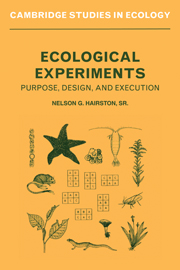Book contents
- Frontmatter
- Contents
- Preface
- Acknowledgments
- 1 Ecological problems and how they are approached
- 2 Minimal requirements of experimental design in ecology
- 3 Trade-offs in ecological experimentation
- 4 Experiments in forests
- 5 Experiments in terrestrial successional communities
- 6 Experiments in arid environments
- 7 Experiments in fresh water
- 8 Experiments in marine environments
- 9 Conclusions to be drawn from field experiments
- References
- Name index
- Subject index
9 - Conclusions to be drawn from field experiments
Published online by Cambridge University Press: 05 June 2015
- Frontmatter
- Contents
- Preface
- Acknowledgments
- 1 Ecological problems and how they are approached
- 2 Minimal requirements of experimental design in ecology
- 3 Trade-offs in ecological experimentation
- 4 Experiments in forests
- 5 Experiments in terrestrial successional communities
- 6 Experiments in arid environments
- 7 Experiments in fresh water
- 8 Experiments in marine environments
- 9 Conclusions to be drawn from field experiments
- References
- Name index
- Subject index
Summary
Introduction
The numbers of ecological field experiments have grown at an increasing rate over the past two decades, and because the theme of this book is that experimentation is necessary for progress in ecology, it is fair to ask what the experiments have revealed about ecological processes. Obviously, observations of field situations and spontaneous occurrences have provided insight throughout the history of ecology, but the present discussion is restricted to intentional manipulations and their contributions to understanding ecological processes.
The most important conclusion to be drawn from the whole group of experiments is that each kind of environment should be considered separately, because there are few, if any, specific statements about ecological processes that will be true across all environments. As stated in the Preface, that is the reason for arranging the experiments by kind of environment in which they were conducted, instead of by kind of interaction, for example. Thus, simultaneous consideration of all experiments on competition, or predation, would not permit as clear statements about ecological processes as does the arrangement adopted.
Forests
The ecological phenomena that have been revealed or confirmed for forests can be assembled into a more coherent analysis than can the results in any other kind of habitat. The experiments in each trophic level have given internally consistent results, and the relationships between trophic levels are consistent with those within each.
- Type
- Chapter
- Information
- Ecological ExperimentsPurpose, Design and Execution, pp. 316 - 328Publisher: Cambridge University PressPrint publication year: 1989

